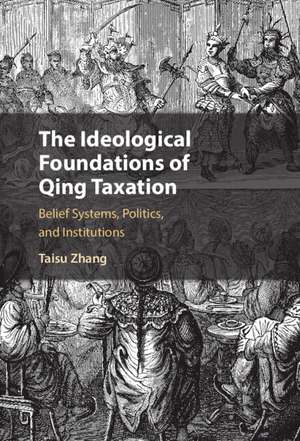The Ideological Foundations of Qing Taxation: Belief Systems, Politics, and Institutions: Cambridge Studies in Economics, Choice, and Society
Autor Taisu Zhangen Limba Engleză Hardback – 8 feb 2023
Din seria Cambridge Studies in Economics, Choice, and Society
-
 Preț: 243.55 lei
Preț: 243.55 lei -
 Preț: 163.31 lei
Preț: 163.31 lei -
 Preț: 135.65 lei
Preț: 135.65 lei -
 Preț: 176.62 lei
Preț: 176.62 lei -
 Preț: 197.90 lei
Preț: 197.90 lei -
 Preț: 166.79 lei
Preț: 166.79 lei -
 Preț: 176.86 lei
Preț: 176.86 lei -
 Preț: 278.72 lei
Preț: 278.72 lei -
 Preț: 203.50 lei
Preț: 203.50 lei -
 Preț: 252.69 lei
Preț: 252.69 lei -
 Preț: 219.90 lei
Preț: 219.90 lei -
 Preț: 363.07 lei
Preț: 363.07 lei -
 Preț: 288.62 lei
Preț: 288.62 lei -
 Preț: 205.41 lei
Preț: 205.41 lei -
 Preț: 299.62 lei
Preț: 299.62 lei -
 Preț: 262.24 lei
Preț: 262.24 lei -
 Preț: 259.34 lei
Preț: 259.34 lei -
 Preț: 228.08 lei
Preț: 228.08 lei - 14%
 Preț: 725.57 lei
Preț: 725.57 lei -
 Preț: 291.68 lei
Preț: 291.68 lei -
 Preț: 290.38 lei
Preț: 290.38 lei - 11%
 Preț: 693.69 lei
Preț: 693.69 lei
Preț: 705.18 lei
Preț vechi: 792.34 lei
-11% Nou
Puncte Express: 1058
Preț estimativ în valută:
134.93€ • 141.26$ • 111.65£
134.93€ • 141.26$ • 111.65£
Carte tipărită la comandă
Livrare economică 08-22 aprilie
Preluare comenzi: 021 569.72.76
Specificații
ISBN-13: 9781316518687
ISBN-10: 131651868X
Pagini: 250
Dimensiuni: 152 x 229 x 29 mm
Greutate: 0.81 kg
Ediția:Nouă
Editura: Cambridge University Press
Colecția Cambridge University Press
Seria Cambridge Studies in Economics, Choice, and Society
Locul publicării:New York, United States
ISBN-10: 131651868X
Pagini: 250
Dimensiuni: 152 x 229 x 29 mm
Greutate: 0.81 kg
Ediția:Nouă
Editura: Cambridge University Press
Colecția Cambridge University Press
Seria Cambridge Studies in Economics, Choice, and Society
Locul publicării:New York, United States
Cuprins
1. A short history of qing taxation; 2. The uses and limitations of rationalist explanations; 3. Pre-qing fiscal regimes; 4. The early qing paradigm shift; 5. Mid-qing entrenchment; 6. Late qing reforms; 7. Theoretical implications.
Recenzii
'A theoretically elegant, evidence-rich, and innovative explanation for why imperial China declined and fell. The Ideological Foundations of Qing Taxation sheds light on the roots of the 'Great Divergence' in economic development between China and Europe. A tremendous achievement that deserves to be widely read.' Yuhua Wang, Professor of Government, Harvard University
'This book is a brilliant new take on comparative economic history. Skillfully integrating institutional analysis, economics, and political thought, Zhang provides us with an erudite, deeply learned account of the Qing's failure to expand tax capacity, drawing us into contemplation of a path not taken.' Tom Ginsburg, Leo Spitz Distinguished Service Professor of International Law, University of Chicago
'In this refreshing and incisive work, Taisu Zhang shows us how the weakness of the late Qing regime depended less on structural constraints than on a specific worldview about the proper role of the state. Low taxation was a deliberate choice, made in response to the presumed lessons of history, and it would have far-reaching implications. This will be of interest to anyone who wants to understand long trends in Chinese political development.' David Stasavage, Julius Silver Professor, New York University
'In this characteristically ambitious book, Taisu Zhang looks for obstacles on China's path to modernization in a surprising place: tax capacity. He explains the unwillingness of China's nineteenth-century rulers to raise taxes neither in terms of eternal cultural values nor structural factors, but rather as the outcome of a specific type of conservatism that can be explained historically.' Michael Szonyi, Frank Wen-hsiung Wu Professor of Chinese History, Harvard University
'Why did the Qing empire consistently under-tax its agricultural base? This book invites one to the backroom of emperors and statesmen as they debated fiscal policy, and performs a masterful dissection of the long-term ideological forces at work. A gripping read.' He Bian, Associate Professor of History, Princeton University
'This book is a brilliant new take on comparative economic history. Skillfully integrating institutional analysis, economics, and political thought, Zhang provides us with an erudite, deeply learned account of the Qing's failure to expand tax capacity, drawing us into contemplation of a path not taken.' Tom Ginsburg, Leo Spitz Distinguished Service Professor of International Law, University of Chicago
'In this refreshing and incisive work, Taisu Zhang shows us how the weakness of the late Qing regime depended less on structural constraints than on a specific worldview about the proper role of the state. Low taxation was a deliberate choice, made in response to the presumed lessons of history, and it would have far-reaching implications. This will be of interest to anyone who wants to understand long trends in Chinese political development.' David Stasavage, Julius Silver Professor, New York University
'In this characteristically ambitious book, Taisu Zhang looks for obstacles on China's path to modernization in a surprising place: tax capacity. He explains the unwillingness of China's nineteenth-century rulers to raise taxes neither in terms of eternal cultural values nor structural factors, but rather as the outcome of a specific type of conservatism that can be explained historically.' Michael Szonyi, Frank Wen-hsiung Wu Professor of Chinese History, Harvard University
'Why did the Qing empire consistently under-tax its agricultural base? This book invites one to the backroom of emperors and statesmen as they debated fiscal policy, and performs a masterful dissection of the long-term ideological forces at work. A gripping read.' He Bian, Associate Professor of History, Princeton University
Notă biografică
Descriere
Surveys the fiscal history of China's last imperial dynasty and explains why its ability to tax was unusually weak.
